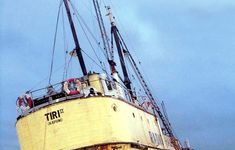1966: Radio Hauraki
October 23, 2019
By AHNZ
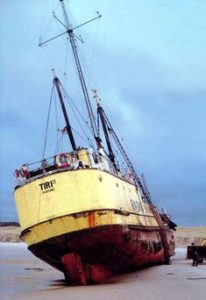 Today in New Zealand history, 23 October, 1966, Radio Hauraki’s ship Tiri set out to bust the State’s monopoly on radio broadcasting. The State has a very long history of controlling the news media in New Zealand. The ‘news’ pathway of all radio news passed through the Prime Minister’s Office for the sake of ‘public interest’. What put a stop to it? Anarchist pirates!
Today in New Zealand history, 23 October, 1966, Radio Hauraki’s ship Tiri set out to bust the State’s monopoly on radio broadcasting. The State has a very long history of controlling the news media in New Zealand. The ‘news’ pathway of all radio news passed through the Prime Minister’s Office for the sake of ‘public interest’. What put a stop to it? Anarchist pirates!
Anarchy can rightly claim the broadcasters and the young people who had to bust through the orthodoxy and State control to free the suppressed sounds of rock music and youth culture.
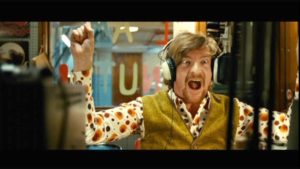
The broadcast entrepreneurs figured out a legal triangle within the Hauraki Gulf which was technically “off shore” from which they could transmit their own radio station. (Makes me wonder if it’s possible to row out to the Gulf to read banned books such as the Tarrant Manifesto and not be subject to police arrest?)
‘Everyone under 23 listened to this; LSD and music came to NZ thus’- Newbold
Getting Busted
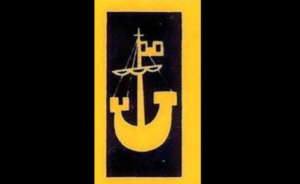 After being stalled by The State for weeks, Radio Hauraki resolved to break the blockade and get started without Government permission. On October 23rd, 1966, Tiri set out from the Western Viaduct of Auckland harbour but got stuck on mud, bridge, and copper. Supporters helped tow the grounded ship off the mud and also risked their lives gumming up the road bridge lowering mechanism with their bodies (somewhere there is a photo of this, I can’t find it.) Tiri’s mast was partly stuck trying to pass through the narrow opening remaining in the partly-lowered bridge and that is when agents of the State boarded her and arrested the Radio Hauraki pirates.
After being stalled by The State for weeks, Radio Hauraki resolved to break the blockade and get started without Government permission. On October 23rd, 1966, Tiri set out from the Western Viaduct of Auckland harbour but got stuck on mud, bridge, and copper. Supporters helped tow the grounded ship off the mud and also risked their lives gumming up the road bridge lowering mechanism with their bodies (somewhere there is a photo of this, I can’t find it.) Tiri’s mast was partly stuck trying to pass through the narrow opening remaining in the partly-lowered bridge and that is when agents of the State boarded her and arrested the Radio Hauraki pirates.
“With help from the large crowd on the quayside the stranded radio ship was pulled from the mud and into a sufficient depth of water to enable her to sail once again under her own power. Just as the Tiri passed beneath the partially lowered road bridge the ship’s mast became entangled on the tip of the structure. Two of the Hauraki team, assisted again by the crowd, forced the tip of the mast past the edge of the road bridge, but part of the Tiri’s superstructure hit the bridge and the impact swung the ship sideways, completely blocking the Basin entrance.
“This gave police the opportunity they needed…”- Offshore Radio Museum.co.uk
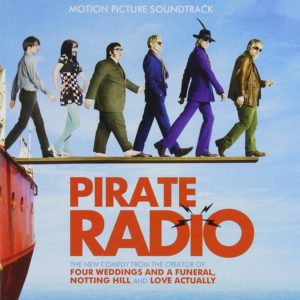 All of this stir only increased the publicity, as did the public meetings and protests to follow, as did the trial at which the pirates were acquitted. Radio Hauraki finally started its regular broadcasts on December 4th and when the station came ‘onshore to New Zealand’ 4 years later it was due to victory over the State monopoly. Other private commercial radio stations around New Zealand could now follow.
All of this stir only increased the publicity, as did the public meetings and protests to follow, as did the trial at which the pirates were acquitted. Radio Hauraki finally started its regular broadcasts on December 4th and when the station came ‘onshore to New Zealand’ 4 years later it was due to victory over the State monopoly. Other private commercial radio stations around New Zealand could now follow.
“The Radio Hauraki crew had spent 1,111 days at sea. The final broadcast from the seabound Hauraki Pirates was a documentary on the station’s history until that point, finishing at 10:00 pm when Tiri II turned and headed for Auckland playing “Born Free” continually. During their final voyage back to shore, announcer Rick Grant was lost overboard.”- Wiki
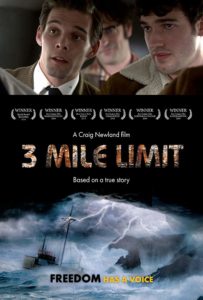 As usual in New Zealand cultural history, even this radical pirate act was following in the footsteps of our cultural locus. Britain had already had pirate radio ships breaking their monopoly too as depicted in The Boat That Rocked (2009) staring Rhys Darby. There’s also 3 Mile Limit (2014) telling the story of Radio Hauraki specifically yet with the wrong names and with complete absence of the popular support and the spirit of the times.
As usual in New Zealand cultural history, even this radical pirate act was following in the footsteps of our cultural locus. Britain had already had pirate radio ships breaking their monopoly too as depicted in The Boat That Rocked (2009) staring Rhys Darby. There’s also 3 Mile Limit (2014) telling the story of Radio Hauraki specifically yet with the wrong names and with complete absence of the popular support and the spirit of the times.
The Pirates (after all that prep work, mind you) were an instant success. They became folk heroes of New Zealand youth, passing on the music and the culture that was transforming the world. All the best classic rock and alternative attitudes to what J.K.Baxter called ‘the concrete playground’, the brass bands, the music recordings of dead people, the approved ‘news’ of The Government. To think, we nearly missed the boat!
—
Ref. Offshore Radio Museum.co.uk
Image ref. Rhys Darby in The Boat That Rocked Copyright: © 2009 Universal Pictures; Hotflick.net
 Like Comment Share
Like Comment Share

